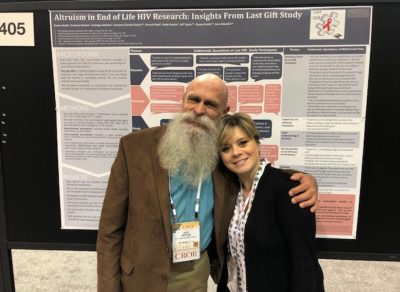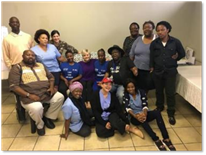Q&A with Karine Dubé, DrPH, MPhil

Karine Dubé With Jeff Taylor, co-investigator and patient advocate
What was your background before joining the faculty at Gillings?
Before joining the faculty, I was completing my Doctorate degree in Public Health Leadership in the Health Policy and Management at UNC Gillings. I have worked in infectious diseases research in various capacities for close to 20 years. I have had to wear many different research hats, including clinical research manager, research program manager, epidemiologist, social scientist, research implementer, research analyst, clinical monitor, and so on. For example, I managed an Ebola research consortium in Liberia in 2016 and worked in Mozambique for 6 years to develop clinical research capacity for HIV prevention trials, with the U.S. Military HIV Research Program and FHI 360. My background bridges international development, socio-behavioral sciences, medical anthropology, epidemiology, empirical ethics, public health and patient/community engagement. I consider myself an interdisciplinarian and like to think beyond disciplinary siloes to solve complex research challenges.
What drew you to the Gillings School of Global Public Health?
The main draw for me was the opportunity to create opportunities for students interested in global public health. I had an outstanding experience as a student in the DrPH program and wanted to create similar opportunities for my students. I also received my bachelor’s degree from UNC and was very involved on campus.
Can you tell us more about your HIV research?
My current research focuses on integrating socio-behavioral sciences as part of ongoing HIV cure-related trials in the United States and South Africa. I am a member of the inaugural AIDS Clinical Trials Group (ACTG) Behavioral Science Subcommittee (BSS), and just received a grant from the U.S. National Institutes of Health to investigate psychosocial experiences of HIV cure trial participants undergoing extended analytical treatment interruptions. I lead several socio-behavioral sciences projects related to HIV cure research and volunteer for community advisory boards focused on HIV cure research.
In doing so, I closely collaborate with several groups implementing HIV cure-related research in the United States and South Africa, including the amfAR Institute for HIV Cure Research, BEAT-HIV Collaboratory (Wistar Institute), Delaney AIDS Research Enterprise (DARE), the defeatHIV Collaboratory (Fred Hutch), the City of Hope/California Institute of Regenerative Medicine (CIRM) and the Ragon Institute of MGH, Harvard and MIT. I am currently leading the socio-behavioral and ethics component of the Last Gift program, which enrolls extremely altruistic people with HIV at the end of their life.
I adopt a lifespan approach to my research, engaging diverse youth in HIV cure research, as well as aging and terminally ill people living with HIV. My research portfolio aims to reduce disparities in access to HIV clinical trials – including increasing the engagement of women, racial and ethnic, and sexual and gender minorities in HIV research. I am currently leading an empirical ethics supplement to investigate ground-breaking areas in my field, including the ethics of interventional HIV cure research at the end of life, cell and gene therapy towards a global HIV cure, combinatorial approaches towards an HIV cure, and partner protection measures during extended analytical treatment interruptions. A couple of years ago, I helped define research priorities related to the behavioral and social sciences of HIV cure research. I am part of the International AIDS Society (IAS) Global Scientific Strategy team, the IAS Research-for-Cure Academy, and the Global Gene Therapy Initiative (GGTI).

Karine Dubé with Females Rising through Education, Support, and Health Team Durban, South Africa FRESH
I am incredibly passionate about giving patients and communities a voice in HIV cure-related research. I strive to understand patient perspectives to improve HIV trial designs. With community members, I am helping revamp our CUREiculum, to make HIV cure science accessible to the community and the HIV research field and to serve as a tool for meaningful stakeholder engagement.
What is your favorite aspect of teaching PUBH 711 Critical Issues in Global Health?
There are several incredible aspects of teaching the PUBH 711 course. These include the caliber and diversity of the students enrolled in the Global Health Concentration, the opportunity to interact with experts, and to help students pursue a topic of passion related to global health throughout the entire semester. Course highlights usually occur towards the end of the semester when students present their call-to-action projects. During the Fall 2020 semester, the course was taught entirely online due to COVID-19; yet it felt like we were able to virtually travel around the world to analyze several critical issues. There is a special sense of global health community developed throughout the course, and students are incredibly thoughtful with their projects. We quickly realize just how interrelated the critical issues really are.
What does “global health” mean to you?
I adopt the UNC Gillings School of Global Public Health philosophy that ‘global health is local health’ and vice-versa, as well as a ‘health for all’ approach. Global health combines research and practice to achieve equity and reduce disparities for all people and should be viewed as a human rights (not a privilege). The World Health Organization Constitution and the APHA Code of Ethics are two of my guiding lights.
What is your favorite hobby?
My favorite hobby is to travel to beautiful places on planet Earth with my husband. Our recent destinations have included Iceland and New Zealand, which we most highly recommend.
Tell us about your favorite teacher that you’ve ever had.
I have had several amazing teachers and mentors. At UNC Gillings, I want to highlight Dr. Sandra Greene, who chaired my DrPH dissertation committee. Dr. Greene is an incredibly effective and generous mentor and is very dedicated to the success of her students. She exemplifies research and mentoring excellence.
